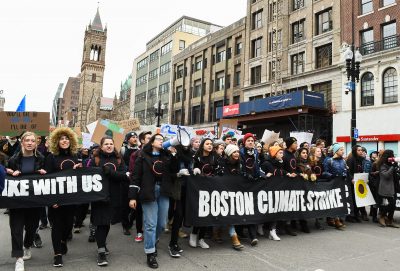With stay-at-home orders in place, many passionate climate change activists, including those at Boston University, are unable to celebrate Earth Day this Wednesday. Local environmental organizations are cancelling their celebrations, including in-person climate strikes in downtown Boston and rallies around the campus and city.

The Environmental Student Organization at BU was planning to work closely with Sustainability@BU this year to participate in charitable efforts and contribute to discussions about climate impact. But Amanda Pliszak, a senior in the College of Arts and Sciences and president of ESO, said the coronavirus has halted their plans and forced the group to operate remotely.
“We can’t really do environmental work in the Boston area, but we have just been having our weekly meetings via Zoom just to encourage the positivity,” Pliszak said. “With every club, the transition to online is tough, but what we’re really focused on right now is keeping our meetings positive and making sure everyone’s mental health is okay. That’s kind of our priority right now.”
ESO is also missing out on city-wide environmental efforts, including the 21st Annual Earth Day Charles River Cleanup, which has been postponed until the fall. Pliszak said the club must now focus on their mission for when quarantine is lifted and the implications that imposes on the climate.
“Obviously, it sucks that we can’t do some environmental volunteering, participate in cleanups and stuff,” Pliszak said. “When everything goes back to a new normal, things might start getting bad again with regards to the environment, so we’ve been having a lot of discussions on, well, how do we keep up?”
Off-campus organizations, such as Sunrise Movement Boston, Climate Strike Boston and The Emerald Necklace Conservancy, are also postponing their gatherings in light of social distancing and suspending or adapting their Earth Day plans to continue their activism.
Emilia Jacobson, a freshman at The Winsor School College Preparatory in Fenway, is a member of Sunrise Movement Boston’s media and action teams. She said she believes the pandemic could force the organization to scale back, especially in terms of education.
“[Coronavirus] makes it a bit harder to increase awareness about climate change,” Jacobson said. “However, it is beneficial in some ways to have online meetings since more people can join [us] oftentimes and it is easier to coordinate.”
While regions witness environmental regrowth and healing amid the pandemic, including decreases in carbon emissions and smog, Sunrise Movement Boston is hesitant to rejoice, Jacobson said.
“One thing we try not to focus on is how [COVID-19] is affecting the environment,” Jacobson said. “There is a slippery slope of [COVID-19] is helping the environment’ and we want to make it clear that [COVID-19] is killing many, many people and that the environmental benefits don’t outweigh the immense problems that are going on.”
DivestBU, an organization which advocates for the removal of fossil fuel investments from BU’s endowment, is also suffering from an absence of engaged activists. To continue their outreach and advocacy, the club will operate a virtual Earth Day parade through Facebook, featuring signs and artwork that honor the ecosystem.
Andrea Wetzler, a freshman in CAS and member of DivestBU, said she thinks the quarantine draws several positives, one being the return of marine animals and ecosystems. Wetzler said she is skeptical that these changes will have a long-term impact and that real change must come from legislation and long-term commitment to climate change reform.
“I think there is an existential dread in a lot of us, we cannot afford apathy and we cannot afford simple ideology,” Wetzler said. “We really need to have concrete implementations of sustainable practices and… is to minimize our investing in fossil fuels.”
Wetzler said she recognizes the environmental achievements during the outbreak are not permanent, but said she hopes it will awaken a new wave of support and advocacy for environmental reform.
“One of the things that we can try to hope for is that, in places which are now seeing mountains and monuments they weren’t able to see before, because of pollution, [people] will feel an urge to protect what they’re seeing,” Wetzler said. “A big part of wanting to conserve nature and, in a way, increasing sustainability, is having a connection to the earth, is knowing what you could lose.”






























































































































